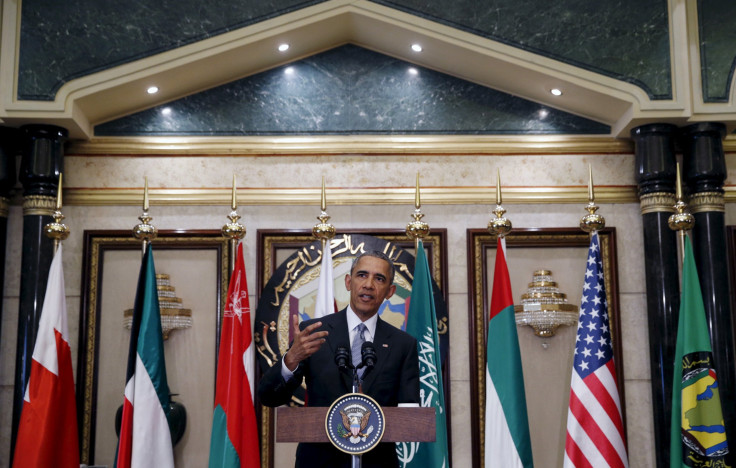Obama Saudi Arabia Speech: Muslim Nations Promise To Fight ISIS

President Barack Obama promised Thursday the United States would stay vigilant against Iran’s activities in the Middle East as he tried to assuage concerns of Arab allies who have been wary of his nuclear deal, the Associated Press reported.
“We will remain vigilant to make sure Iran fulfills its commitments, just as we fulfill ours,” Obama said.
The president was in Saudi Arabia Thursday to meet with officials from six Persian Gulf countries. He said the leaders talked about ways to move forward in their joint effort against the Islamic State group and that members of the Gulf Cooperation Council agreed to “increase their contributions to the fight.”
Obama also asked the countries to ramp up their support for rebuilding Iraq and said the nations agreed to help the war-torn country currently under threat from the militant group known as ISIS.
The president’s remarks in Saudi Arabia came after talks that were aimed at reassuring allies in the Middle East who have expressed serious doubts about Obama’s handling of Iran and his policy toward Syria, which is still in the midst of civil war. Saudi Arabia’s King Salman called the talks “constructive and fruitful."
Pres Obama also said that a lot of the reported strain in US/Saudi relationship "was always overblown." pic.twitter.com/zdpyrUsZmN
— Mark Knoller (@markknoller) April 21, 2016
Obama said the fragile cessation of hostilities in Syria was under “tremendous strain” and condemned the continued violations. He said the U.S. and its allies need to stick to their strategy of finding a political solution to Syria’s problems.
“This violence is yet another reminder that there's just one way to end this civil war," Obama said, adding that this was a point on which the Gulf Cooperation Council agreed. In addition to Saudi Arabia, the council includes the United Arab Emirates, Qatar, Kuwait, Oman and Bahrain.
The Gulf nations agree that ISIS poses a significant threat to their region and have joined the U.S. in bombing campaigns against the group, but they want to see the U.S. do more to oust Syrian President Bashar Assad, the AP noted. While speaking to reporters after his talks Thursday, Obama reiterated his view that Assad needs to be removed in order to transition to a calmer situation in Syria.
Pres says Gulf leaders concerned about Iran might feel emboldened by nuke deal and don't want to be "naive" about Iran threat.
— Mark Knoller (@markknoller) April 21, 2016
Beyond Syria, the largely Sunni-led Gulf countries are also wary of Obama’s willingness to negotiate with Iran — a Shiite nation — and still worry that the nuclear deal Obama struck with the country last year could end up shifting the balance of power in the region away from them. Sunni and Shia are the two major denominations of Islam, and there is often tension between countries led by the different sects, as well as conflict within countries that are home to both types of Muslims.
Obama said the nuclear deal does not erase “serious concerns” the U.S. and its allies have about Iran’s behavior, but he remains open to negotiating with the country. “None of our nations have an interest in conflict with Iran,” Obama said.
He also said the GCC allies warned against being “naive” when it comes to Iran. The U.S. has said Iran is meeting its commitments outlined in the nuclear deal, but it has continued to violate other international agreements. Both Republicans at home in the U.S. and Sunni-led countries have criticized the president for granting Iran relief from sanctions under the deal, and it continues to be a point of contention.
© Copyright IBTimes 2024. All rights reserved.





















